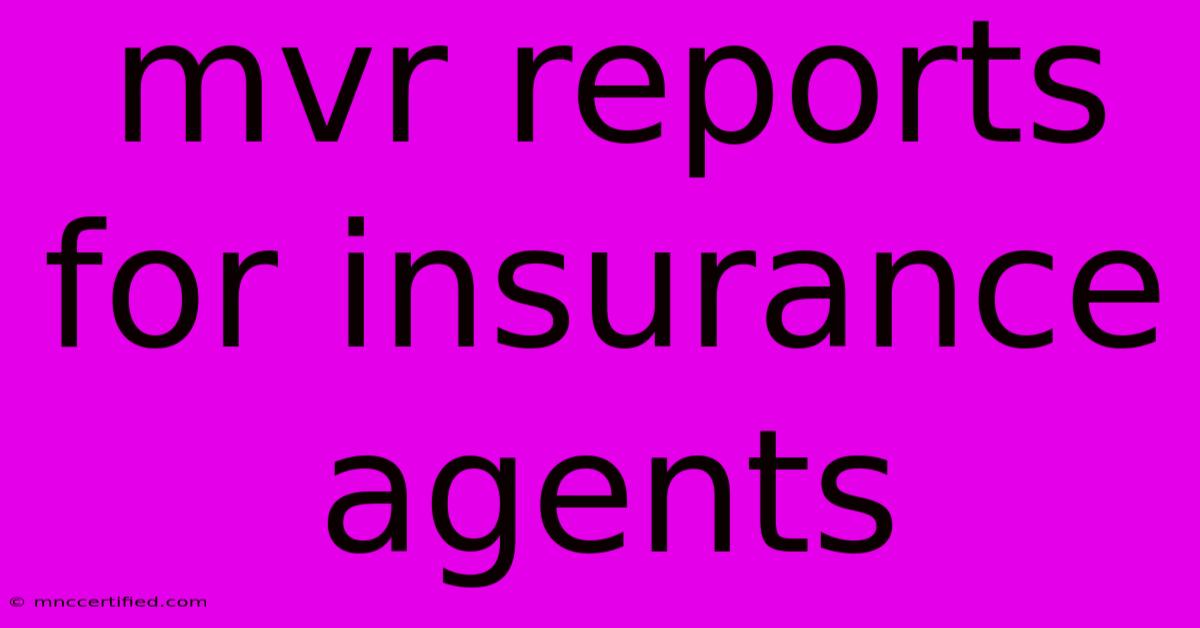Mvr Reports For Insurance Agents

Table of Contents
MVR Reports: An Insurance Agent's Essential Tool
For insurance agents, access to accurate and up-to-date driver information is paramount. This is where Motor Vehicle Reports (MVRs) come in. Understanding how to obtain and interpret MVRs is crucial for accurately assessing risk, setting appropriate premiums, and maintaining a successful insurance business. This comprehensive guide will equip you with the knowledge to effectively utilize MVR reports.
What is an MVR Report?
An MVR report, also known as a driving record, is a compilation of a driver's history obtained from the Department of Motor Vehicles (DMV) or equivalent state agency. These reports contain crucial information impacting insurance risk assessment, including:
- Driving History: Accidents, citations, and suspensions are meticulously documented, providing a clear picture of a driver's past behavior behind the wheel.
- License Status: The report confirms the validity of the driver's license, indicating whether it's currently active, suspended, revoked, or expired.
- Vehicle Information: In some cases, details about the vehicles owned or operated by the driver may be included.
- Points System: Many states utilize a point system, and the report reflects the accumulation of points due to traffic violations. High point totals often translate to higher insurance premiums.
Why are MVR Reports Essential for Insurance Agents?
MVR reports are indispensable for insurance agents for several key reasons:
- Accurate Risk Assessment: By analyzing the driving history, agents can accurately assess the risk associated with insuring a particular individual. This ensures fair and appropriate premium pricing.
- Fraud Prevention: MVR reports help detect inconsistencies or potential misrepresentations in applications, protecting the insurance company from fraudulent claims.
- Compliance and Regulation: Using MVR reports demonstrates compliance with state regulations and industry best practices for underwriting.
- Improved Customer Service: Providing clear explanations of premium calculations based on MVR data fosters trust and transparency with clients.
Obtaining MVR Reports: A Step-by-Step Guide
The process of obtaining MVR reports varies slightly by state. Generally, you will need:
- Client Authorization: Obtain written consent from the client authorizing you to access their driving record. This is crucial for maintaining privacy and complying with data protection laws.
- Proper Identification: You'll need to provide the client's full name, date of birth, driver's license number, and potentially other identifying information.
- Third-Party Service or Direct Access: Many states allow access to MVRs through third-party data providers specializing in insurance information. Alternatively, some states allow direct access through their DMV website. However, direct access usually requires specific licensing and adherence to security protocols.
- Fees: Expect to pay a fee for each MVR report obtained. These fees vary by state and provider.
Interpreting MVR Reports: Key Considerations
Understanding the information contained in an MVR report requires careful attention to detail. Pay close attention to:
- Severity of Violations: A DUI carries significantly more weight than a parking ticket.
- Frequency of Violations: Multiple offenses within a short timeframe indicate a higher risk profile.
- Accident History: The number and severity of accidents are critical indicators.
- Dates of Violations: Older infractions may have less impact than recent ones, depending on the state's point system and insurance company policies.
Legal and Ethical Considerations
Always adhere to relevant data privacy laws (e.g., FCRA in the US) when handling MVR reports. Maintain client confidentiality and use the information solely for underwriting purposes.
MVR Reports and Your Business Success
Integrating MVR reports into your workflow is a strategic investment that improves efficiency, enhances risk assessment, minimizes losses, and contributes to long-term business success. By mastering the use of MVR reports, you demonstrate professionalism, accuracy, and compliance, establishing yourself as a reliable and knowledgeable insurance agent. Remember to stay updated on state-specific regulations and best practices for handling sensitive driver information.
Off-Page SEO Considerations:
- Build high-quality backlinks: Reach out to relevant insurance industry blogs, forums, and websites to collaborate on content or secure backlinks to this article.
- Social Media Promotion: Share this article on relevant social media platforms, engaging with insurance professionals and consumers.
- Guest Blogging: Write guest posts for insurance-related websites, incorporating a natural link back to this comprehensive guide.
- Local SEO: Optimize your online presence for local searches using your business location and services.
By consistently implementing these on-page and off-page SEO strategies, you will significantly improve your article's search engine rankings and attract a wider audience. Remember, consistent high-quality content and engagement are crucial for long-term SEO success.

Thank you for visiting our website wich cover about Mvr Reports For Insurance Agents. We hope the information provided has been useful to you. Feel free to contact us if you have any questions or need further assistance. See you next time and dont miss to bookmark.
Featured Posts
-
Penns Climate Plan Updated Priorities
Nov 21, 2024
-
19 24 An Hour Is How Much A Year
Nov 21, 2024
-
New Film The Merry Gentlemens Stars
Nov 21, 2024
-
2 Points On License Nj Insurance
Nov 21, 2024
-
19000 A Year Is How Much An Hour
Nov 21, 2024